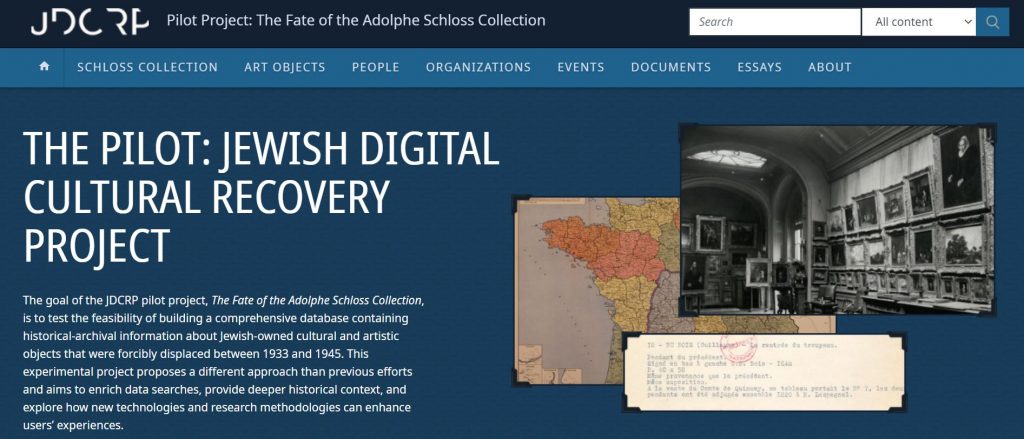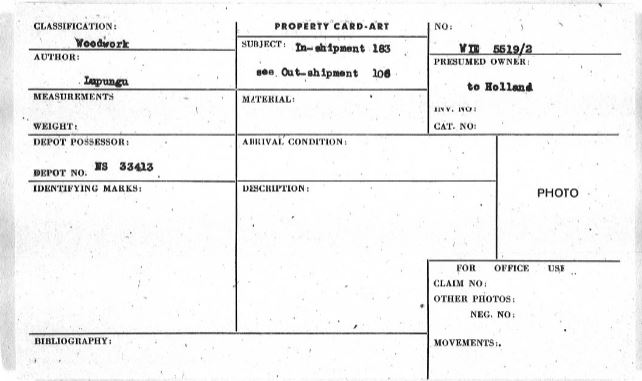The Jewish Digital Cultural Recovery Project (JDCRP) was initiated in 2016 by the Claims Conference and the Commission for Art Recovery (CAR) as part of an ambitious plan to expand and develop the database of objects plundered by the Einsatzstab Reichsleiter Rosenberg that transited through the Jeu de Paume in Paris – the ERR Database created by the Claims Conference.
With its expansion, the Database is on track to become the most comprehensive listing of all Jewish-owned cultural objects plundered by the Nazis and their allies, from the time of their spoliation to the present day, pursuant to a resolution of the European Parliament and the 1998 Washington Conference Principles.
The Jewish Digital Cultural Recovery Foundation (JDCRP Stiftung) was established under German law to accept funds for the Project. Rüdiger Mahlo, Representative of the Claims Conference in Germany, is Chair of the Board of Trustees, and Wesley Fisher, Director of Research at the Claims Conference and WJRO, represents the Executive Board.
Pilot Project I

The JDCRP Pilot Project entitled The Fate of the Adolphe Schloss Collection, co-funded by the European Union (EU), was completed in July 2021 with the launch of a central database of documentation of cultural objects plundered by the National Socialists, their allies, and their collaborators.
The National Socialists’ systematic art plunder was especially intensified after 1938 when Germany annexed Austria and then invaded most of Europe. Objects of art such as paintings, sculptures, Judaica, and books were forcibly taken from private Jewish collections. The annihilation of Jewish culture and the unprecedented displacement of a vast number of cultural objects during the Nazi era have never been fully documented and the pilot project that concentrated on 333 paintings that were part of the Schloss family’s collection included all the phases of implementation of a comprehensive database, with a smaller volume and thematic scope that allowed for the JDCRP database to be designed and built based on the results.
Pilot Project II

The second part of the JDCRP’s pilot project is to link archival repositories on Nazi-looted cultural property by focusing on populating its emerging cross-searchable digital data platform. This project will consolidate a selected group of digitized archival data on plundered cultural property to enable keyword searches at the document level. Archival material from the Wiesbaden Central Collecting Point of the American Allied Forces, as well as from the records of the Einsatzstab Reichsleiter Rosenberg (ERR) Nazi looting agency will be included.
Documentation of Persecuted Jewish Artists

The project “Documentation of Persecuted Jewish Artists” includes an exploration of the lives of persecuted Jewish visual artists, many of whom made an outsized contribution to artistic milieus throughout Europe during their tragically abbreviated careers. Numerous Jewish artists perished in the Holocaust, while the lives and art of those who survived was ineluctably changed by their traumatic experiences. The project will provide documentation of the life and artistic works of these persecuted Jewish artists, creating a virtual reconstruction of a once vibrant artistic culture. The project builds on existing database and published information, centralizing and collecting information from numerous countries.
Initial List Documenting Persecuted Jewish Artists
Documentation of Persecuted Jewish Collectors

In March 2023, the JDCRP published a first initial list of approximately 2,000 names of persecuted Jewish collectors from various European countries. The JDCRP continued the research and presented as of January 2024 an updated list of over 2,600 Jewish collectors from 13 countries, including Austria, Croatia, Belgium, the Czech Republic, Estonia, France, Germany, Hungary, Italy, the Netherlands, Norway, Poland, and Serbia.
The JDCRP will develop this initial list further to transform it into a powerful research tool. The detail-oriented list will include information to the extent possible on collectors’ lives, their family and business connections, the types of their collections, and their persecution histories. Sources will be meticulously listed to provide easily accessible additional information. A few examples can be accessed here.
Preliminary List of Educational Material on Looted Cultural Property and Provenance Research.

Contact Information
European Office
Jewish Digital Cultural Recovery Project
c/o Schwenke Schütz
Bernburger Strasse
10963 Berlin
Email: info@jdcrp.org
last updated February 2024

